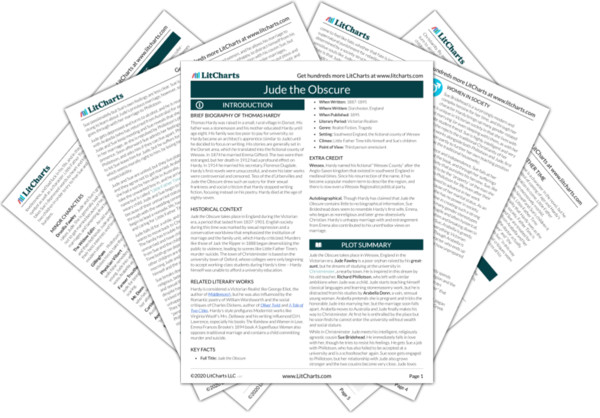Summary
Analysis
Two months later Arabella meets with the quack-doctor Vilbert, who tells her something that cheers her up. That evening Jude tells Arabella that he should probably move away, but Arabella cries and tells him (in roundabout language) that she is pregnant. Jude is shocked but he immediately offers to marry Arabella. He admits that it is a “complete smashing up” of his dreams of Christminster, but he decides to do the honorable thing.
Hardy can’t even mention pregnancy, especially if it occurs outside of marriage. Jude continues to be high-minded even to his own detriment, as he chooses to stick to the honorable path even though it destroys his dreams of Christminster. He is now idealizing both Arabella and marriage instead of the university.
Themes
That night Jude starts to realize that Arabella will not make a good wife, and the townspeople gossip about how Jude’s lofty ideals have fallen. The two are soon married, and the narrator comments on the ceremony where they swear to feel exactly the same way for the rest of their lives, and where no one is surprised by such an oath. As a wedding present Jude’s great-aunt sends him a cake and another declaration that it would have been better if he died with his parents.
Hardy begins his explicit criticism of marriage. His main complaint is that it is a contract binding people for life (divorce was rare and frowned upon), but is usually made by young, innocent people in the grip of hormones – the people least qualified to make such a huge decision. Drusilla acts as the voice of fate and tragedy.
Themes
The couple settles in together in a small cottage between Marygreen and the Brown House. On their wedding night Arabella reveals that she has been wearing an extra bundle of hair that is not her own (to make her own hair look bigger), and also that she used to be a barmaid in Aldbrickham, a nearby town. Jude realizes that Arabella has a kind of “artificiality in [her] very blood.”
Arabella is further associated with alcohol, another “sinful” pleasure that is also Jude’s weakness. Arabella is the opposite of Sue and an example of all that Victorian society found sinful and bad about women – she is greedy, narrow-minded, tempting, and artificial.
Themes
The couple is satisfied for a few weeks, and one day Arabella meets her friend Anny in town. Arabella reveals that she isn’t actually pregnant, and Anny congratulates her on “shamming it.” One night Jude asks Arabella about the pregnancy, and she says she “made a mistake.” Jude is shocked, and suddenly sees his situation differently – he feels trapped by the marriage, condemned by one impulsive action (marrying Arabella) for the rest of his life.
Hardy never relents in his (often heavy-handed) condemnation of marriage. Hardy himself was estranged from his first wife, and so his arguments here are personal. He feels that one impulsive decision should not be able to ruin a young person’s life, especially as the contract of that decision is totally determined by society.
Themes
Literary Devices
Get the entire Jude the Obscure LitChart as a printable PDF.













